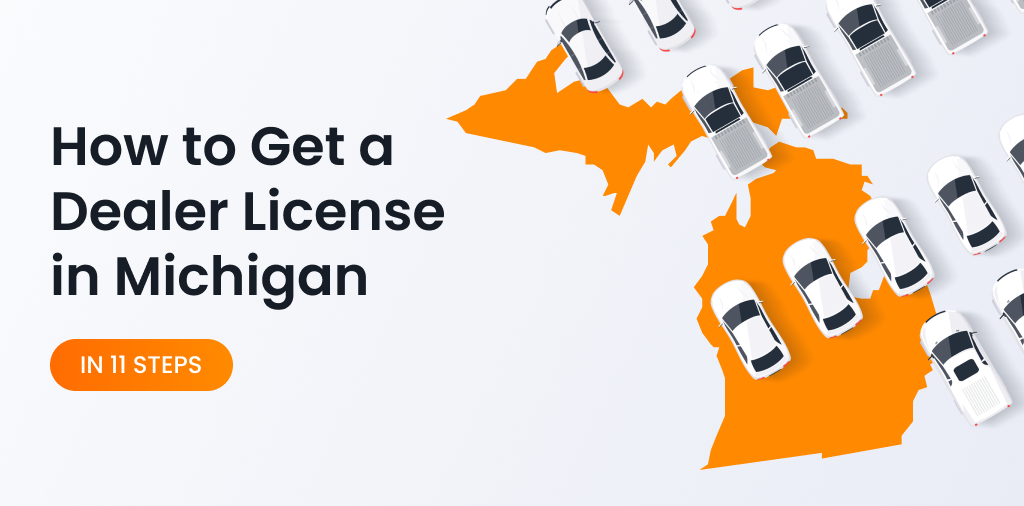How to Get a Dealer License in Michigan (11 Steps)
In Michigan, individuals and businesses that engage in five or more motor vehicle transactions during a year are required to get auto dealer’s licenses.
1. Meet the Michigan Dealer License Requirements
Before you can obtain a motor vehicle dealer’s license in Michigan, you must meet several conditions and perform all of the following tasks:
- Complete and submit the application.
- Submit a zoning approval form unless you are applying for a Class H license.
- Secure a place of business that meets the state’s requirements.
- Submit a copy of your business’s articles of incorporation or other business creation documents filed with the state.
- Get fingerprinted and submit your signed receipt.
- Pay the dealer’s license fee.
Different classes of licenses also have specific requirements, including the following:
- Class A – Submit a copy of the franchise agreement with the manufacturer.
- Class A and Class B – Submit a completed dealer selection form.
- Class A and Class B – Have a registered repair facility or an agreement with a facility that is registered.
- Class A and Class B – Have a minimum of two dealer plates.
- Class A, Class B, and Class D – Purchase a $10,000 Michigan auto dealer bond.
- Class A, Class B, and Class W – Submit proof of Michigan no-fault fleet insurance.
- Class C and Class R – Submit a copy of your workers’ compensation insurance or the notice of exclusion.
2. Figure Out Your License Type
The first step is to figure out which type of auto dealer license you need based on how you intend to operate your business. If you plan to operate more than one type, you will need to obtain a license for each one.
Michigan issues 10 different auto dealer’s licenses based on the applicant’s intended role within the industry, including the following:
- Class A license for new vehicle dealers
- Class B license for used vehicle dealers
- Class C license for used vehicle parts dealers
- Class D license for motor vehicle brokers
- Class E license for distressed vehicle transporters
- Class F license for motor vehicle scrap metal processors
- Class G license for motor vehicle salvage pool dealers
- Class H license for foreign salvage motor vehicle dealers
- Class R license for automotive recyclers
- Class W license for a wholesale dealer
To get the appropriate dealer’s license in Michigan will require you to complete an application and submit it to the Secretary of State. You will also need to meet the other eligibility criteria before a license can be issued to you.
3. Secure a Permanent Location for Your Business
Michigan auto dealers are required to purchase or lease permanent locations for their businesses that meet all of the following requirements:
- Includes an enclosed building that will only be used for commercial purposes
- All records and documents stored on-site
- Must include a furnished office of a minimum of 150 square feet, and it must also include a functioning bathroom
- A telephone number must be listed in the name of the business
- Must have a well-lit display area of a minimum of 1,300 square feet that can hold at least 10 vehicles
- Must have a customer parking area of at least 650 square feet
- Business hours of operation must be posted
- Must include a registered repair facility or have a contract with a facility that is located within 10 miles of the business
4. Erect a Permanent Sign
Michigan requires auto dealers to have permanent signs erected that are visible from the closest street. This sign must display your business name.
5. Secure Zoning Approval From the Zoning Authority
Before you can open your business, you must first secure zoning approval from the local zoning authority. This approval certifies that your business location complies with the relevant zoning regulations, and you will need to submit a copy of the zoning approval form with your application for a dealer’s license.
6. Attend and Complete the Required Dealer Training Course
If you intend to get a Class A or Class B dealer’s license, you will be required to complete a training course before you submit your application for your license. You can register for a class on the Secretary of State’s website.
7. Secure a Motor Vehicle Dealer Surety Bond
Class A, Class B, Class D, and Class H dealers are all required to purchase and maintain motor vehicle dealer surety bonds of at least $10,000 before they can secure their licenses. The other classes are exempt from the requirement to obtain surety bonds. The bond cost will vary, depending on your credit score and other factors. You can anticipate paying between $100 and $300 for a $10,000 motor vehicle dealer bond in Michigan.
Estimate your surety bond cost with our free surety bond cost calculator.
8. Secure No-Fault Fleet Insurance
If you intend to get a Class A or Class B motor vehicle dealer’s license, you must purchase no-fault fleet insurance and submit a certificate of insurance when you submit your application. The insurance you obtain must have minimum liability limits of $20,000 per injured person, $40,000 per accident, and $10,000 for property damage.
9. Complete and Submit the Application
Complete and submit the dealer application form on the Secretary of State website and mail it to the following address:
Michigan Department of State
Business Licensing Section
Lansing, MI 48918
Your application packet should include all of the following:
- Fingerprints
- Municipal approval
- Sales tax number from the Michigan Department of Treasury
- Franchise agreement if you are applying for a Class A dealer license
- Designated branch office form stating where transactions will occur
- A minimum of two dealer plates for a Class A or Class B license
- Servicing agreement with a repair facility if you do not have a registered facility located at your business
10. Submit the Fees
You will need to submit an application fee of $75 and an additional fee of $10 for each dealer plate you request.
11. Pass a Business Inspection
Before your dealer’s license will be issued, your business location must pass an inspection.
In addition to these steps, you should also refer to the instruction booklet from the Secretary of State to ensure that you meet all of the requirements for the particular type of license you intend to apply for.
Once you obtain a motor vehicle dealer’s license, it will expire on Dec. 31. You will need to complete the steps for a license renewal before its expiration date to keep your license and your ability to continue operating your business in good standing. You can renew your license online or by mail.




